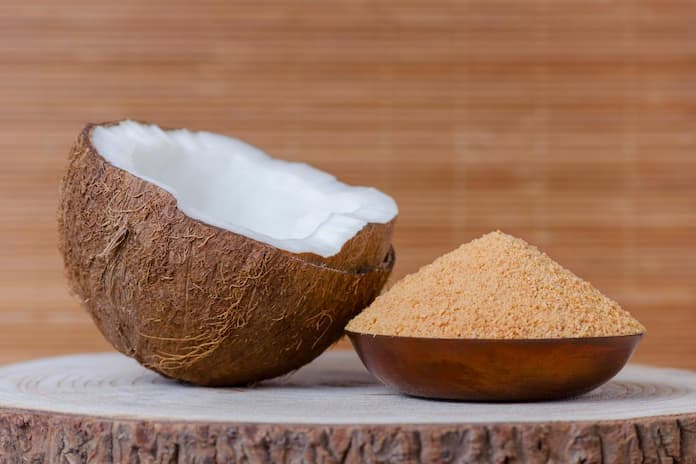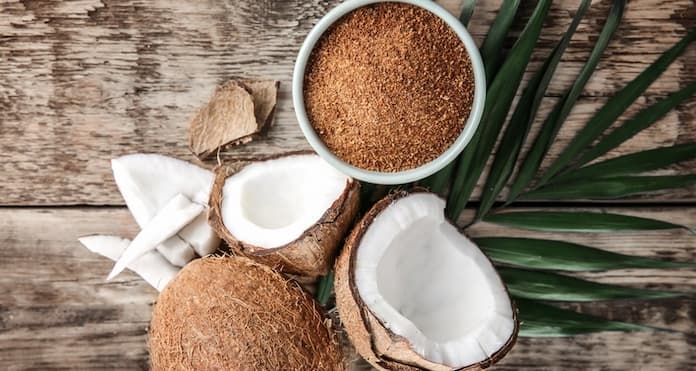
What Is Coconut Sugar?
Coconut sugar has become a very popular alternative sweetener in the last few years, considering the increased usage of synthetic sugars and high-fructose corn syrup in many foods. Coconut sugar is made from the coconut fruit of the coconut palm tree. The tree, scientifically known as Cocos nucifera, thrives in many parts of the world, mainly in Asian countries and tropical places.
This natural sugar is obtained from the sap of cut flower buds of the coconut palm and then used in the same manner as regular sugar. But, instead of the simple “empty calories” of ordinary sugar, premium organic coconut sugar is rich in zinc, potassium, magnesium, calcium, copper, polyphenolic chemicals, specific fibre, vitamin C, and other antioxidants, due to the simple collection and production processes. Although it’s the healthier option, coconut sugar must be used in moderation because it’s still high in fructose, which can harm various health conditions.
Health Benefits of Coconut Sugar

Supports Weight Loss
Coconut sugar, which contains less fructose than regular table sugar, is less likely to contribute to fat deposition. When the liver breaks down fructose, it produces triglycerides, which are a type of fat. The fructose in fruit is regarded as healthful and suitable, while added sugar should have a lower fructose level. Coconut sugar contains less fructose than high-fructose corn syrup and other natural sugars, resulting in less weight gain and fat deposition. So, for maximum fat burn, start using this sweet organic alternative besides your regular consumption of weight loss foods.
Boosts Blood Circulation
The modest amount of iron in organic coconut sugar affects blood circulation, which can boost oxygenation and nutrient availability in the body. Iron is a critical component of red blood cells, and a lack of it in the body can cause anaemia symptoms such as muscle weakness, headaches, fatigue, and gastrointestinal issues.
Has Low Glycemic Index

The Glycemic Index is a measurement that assesses the influence of carbohydrate-containing foods on our blood sugar and glucose levels. The Glycemic Index of coconut sugar is relatively low. It ranks just 35 on the index, whereas ordinary table sugar ranks between 60 and 65. High GI foods can cause your blood sugar to increase unexpectedly, putting a strain on your insulin levels. Furthermore, coconut sugar includes insulin, a fibre that is known to delay glucose absorption.
Boosts Energy Levels & Improves Mood
Coconut sugar contains slightly different raw ingredients for energy than typical table sugar, and it takes the body longer to metabolise. This results in a more steady and long-term energy metabolism, giving you regular energy levels throughout the day rather than the sugar surge and inevitable crash.
On the other hand, regular, moderate usage of this sugar can help with hormone and neurotransmitter levels, which can minimise feelings of sadness and anxiety and lead to more stable moods.
Promotes Gut Health
Insulin, the star fibre in coconut sugar, can boost the growth of intestinal bifidobacteria. Bifidobacteria have been shown to help replenish beneficial bacteria in the stomach while also increasing immunity. Thiamine, riboflavin, vitamin B6, and vitamin K are all produced by bifidobacteria.
However, to gain the maximum gut benefits of organic coconut sugar, you must be a conscious buyer. Many brands may sell coconut sugar in combination with cane sugar. As a result, thoroughly study the ingredient label before making a purchase.
Strengthens Immune System

Coconut sugar, which contains trace amounts of vitamin C, has a major impact on the immune system and can stimulate the creation of white blood cells, which are the body’s first line of defence against external substances and infectious microorganisms.
Best Uses of Coconut Sugar
Coconut sugar, like conventional sugar, can be utilised in various ways, but its collection and production process involves a little more effort. Furthermore, less is needed to get the same flavour because it’s sweeter than regular sugar. Use half the amount of coconut sugar that a recipe calls for in place of regular sugar, and then adjust to taste.
Moreover, coconut sugar can be used to make pastries and candies and sweeten cocktails, shakes, and smoothies. You may also use coconut sugar to caramelise vegetables and fruits in savoury dishes. This natural alternative is also commonly used in beverages such as tea and coffee, as well as sauces and dips.
Coconut Sugar and Its Side Effects

Cardiovascular Problems
Consuming too much sugar in any form might put your cardiovascular health at risk as there is a direct link between added sugar consumption and the collapse of blood vessels and arteries.
Diabetes
Because of its fructose content, this natural sugar variation can cause complications for people with diabetes. Although the percentage of fructose in coconut sugar is lower, it can still be converted into simple sugars, resulting in severe blood sugar rises and decreased insulin sensitivity. Although the inclusion of inulin, a type of fibre, helps to mitigate this process, moderation is still required.
Weight Gain
If you ingest too much coconut sugar, your body cannot convert it into usable energy, resulting in some of those carbs being stored as fat. This might lead to the accumulation of excess adipose fat, resulting in weight gain. Moreover, coconut sugar is high in calories, which is not ideal for persons who are attempting to lose weight and keep a strict calorie restriction.
Slow Metabolism
Despite the apparent energy burst, more fat deposition and high amounts of sugar can slow the metabolism. Coconut sugar is healthy in small amounts and may aid the smooth functioning of the metabolism, but in large amounts, it has the opposite effe in large amountsct.
Chronic Inflammation
Inflammation is a common side effect of consuming too much sugar. This is partly due to excess fat deposition, which can cause inflammation in the gut and surrounding organs. Diabetes patients and those at high risk have greater levels of inflammation.















